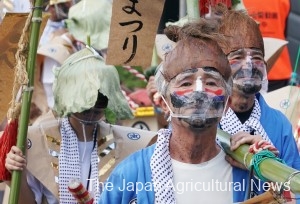
Local residents wearing colorful makeup and face shields participate in the Hyoge Matsuri festival which was held in Takamatsu, Kagawa Prefecture, for the first time in three years.
KAGAWA, Sept. 23 – Hyoge Matsuri, a festival to give thanks for the blessing of water and pray for a rich harvest, was held in the Asano district of Takamatsu, Kagawa Prefecture, in mid-September.
Around 160 local residents, wearing eccentric makeup and dressed as vegetables, paraded for some 2 kilometers in the district.
The festival, named after a word “hyogeru” from the local Sanuki dialect which means to clown around, has a history of more than 300 years. It was resumed this year after being canceled two years in a row due to the spread of COVID-19.
The event had been organized by a preservation group made up of local residents, mainly farmers. But since it had become difficult to hold the festival only by farmers, a new system was introduced this year for the whole community to get involved.
In addition to farmers, non-farm residents who occupy roughly 60% of the district were asked to participate.
The organizers took thorough measures to prevent COVID-19 infections. They reduced the number of participants by about 20% in comparison to an average year and monitored their health conditions for a week prior to the festival. Participants wore face shields during the parade.
Tsutomu Uehara, 80, a rice farmer who heads the festival preservation group, said, “We are just borrowing the history of the festival. All of us will make efforts to preserve it and hand it down to the next 300 years.”
Preservation of festivals and other traditional events in rural areas with aging and declining population has become even more difficult with the COVID-19 pandemic which forced organizers to cancel the events.
The Cultural Affairs Agency this spring launched a project to help hand down regional traditional festivals, offering assistance for repairing parade floats and costumes, as well as promoting the events.
Local governments and preservation groups can receive support in conducting online streaming, recruiting volunteers and preparing materials to prevent COVID-19 infections before and during events.
The agency offered such assistance to more than 700 events by August.
The organizers of Hyoge Matsuri were supported in creating a special website for the festival, shooting a video of the event and preparing masks and sanitizers for the participants.

